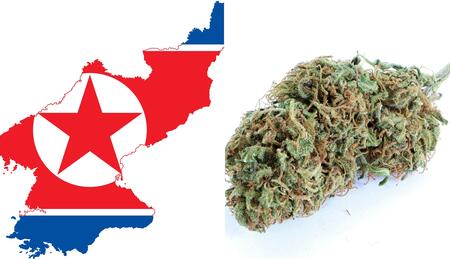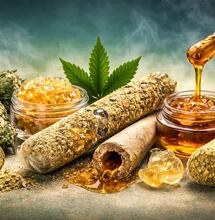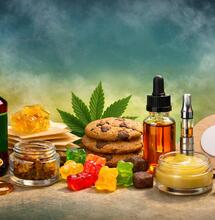Myth Busting: Is North Korea a pothead’s paradise

For years now, the stoner side of the world loved the idea that one of the most tight-lipped countries, North Korea is a pothead's paradise. Several marijuana news outlets, as well as many tabloids, hailed the North as a promised land for any weed smoker, even dubbing it 'the next Amsterdam' of weed tourism.
The news of North Korean weed to be legal, mind-blowingly cheap, abundant and sold openly to Russian and Chinese tourists on the border for $3 a pound, has cycled through the internet for years. But, seriously‒while everyone loves a sensationalist piece from time to time‒declaring North Korea as completely 'baked' is a wee ambiguous. Just like everything that comes as 'news' from the Hermit Kingdom is hazy, so is the claim that marijuana is legal and in abundance.
North Korea, no, it's not a pothead's paradise
In 2017 an investigation by the Associated Press debunked the myth of the weed-friendly totalitarian nation. AP's Eric Talmadge provided conclusive evidence that marijuana is a controlled substance in the same category as heroin and cocaine, and therefore is illegal. Torkel Stiernlof, a Swedish diplomat in North Korea told the Associated Press that no one should doubt the illegal status of marijuana in the controlled country.
"One can't buy it legally and it would be a criminal offence to smoke it," Stiernlof told AP. He said if a foreigner caught violating drug laws in North Korea happened to be an American citizen, he/she could "expect no leniency whatsoever." Still, first-person accounts and news articles have continued to flood the internet in recent years, spreading the idea that North Korea is largely 'green and baked.'
Given that most of what we know about life inside of North Korea comes from outside agencies and the internet does not exist outside a closed domestic network, the question of how did this rumor spread comes naturally. According to AP, a U.S.-government-funded news service called Radio Free Asia lit up a round of stoner glee sharing the story of Rason, a special economic zone on North Korea's northernmost border where a large, bazaar-style market takes place welcoming dozens of Chinese and Russian tourists looking for a cheap pot.
Another account of ‘legal pot in North Korea’ was confirmed by a freelance writer in 2013 who blogged about his experience rolling "comically oversized joints" in a middle of a crowded market on the country’s northern border. "Bizarre as the situation was, it seemed a reasonably safe move," he wrote. ‘No one intervened.’ News outlets picked up the story and gratefully praised the nation's "dirt-cheap" ganja and "liberal policy of tolerance."
Where there is ‘green smoke’ there usually is at least little fire
While categorically denying or confirming such claims is merely impossible, where there is ‘green smoke’ there usually is at least little fire. The fire, in this case, is hemp.
Hemp, a green, fluffy substance is a type of cannabis plant, and, unlike its popular cousin marijuana, it contains only a trace amount of the psychoactive chemical compound THC. According to the AP, hemp is grown legally with state sanction and it is used to make consumer goods ranging from towels and cooking oil, to belts and military uniforms. UPI reported that North Korea actually encourages hemp cultivation as it is a great source for fueling the state’s military drones.
Troy Collings, a managing director of a travel agency that brings tourists to North Korea, told the AP that the hemp doesn’t contain any THC and is just sold as a cheap substitute for tobacco. "It grows wild in the mountainous regions of the North and people pick it, dry it and sell it in the markets, but it doesn’t get you high no matter how much you smoke,” Collings said. The Pyongyang Hemp Processing Factory markets hemp products as “environmentally friendly” and “perfect for the 21st century.”
An official at the factory told the AP that several varieties of hemp grow in North Korea, but all of them are very low in THC. Industrial hemp is so low in THC that it’s usually useless for recreational or medical purposes. Hemp is even cultivated in a different manner in North Korea, focusing on male plants that don’t generate buds, and it is the female plants’ buds that recreational users are most after.
Hemp tradition on the Korean peninsula
Cannabis was an important crop in ancient Korea and there is evidence dating to 3000 B.C. of fabric from hemp discovered in the country. Moreover, the traditional Sambe cloth is made from hemp. North Korea grows something else that might have caused the marijuana confusion: a mix of greenish uncured tobacco leaves referred to as ipdambae (잎담배) or what would be "leaf tobacco" in translation.
Ipdambae is sold as a cheap alternative to cigarettes at markets in Pyongyang and across North Korea and is used in pipes. It’s a green potpourri-like mixture of herbs, and pot-amateurs could easily confuse ipdambae for weed. Smoking too much ipdambae could definitely give a buzz and a bad headache, but that would happen as a result of the nicotine in the tobacco.
Simon Cockerell, general manager of another travel agency that specializes in bringing foreign tourists to North Korea, told the Associated Press the idea marijuana is legal in North Korea has become so hyped that it’s common for tourists to ask what to expect.
“We apologize but have to inform those enquiring about this that weed is not legal. They are not going to be able to get any there,” he said.
“The idea that the country is full of stoners blissfully getting high in a legal-weed paradise is not an accurate one,” he added. “Not having seen or done something doesn’t mean it is never seen or done, of course. But I have never seen this.”
As it turns out, the North’s deadly serious stance on the distribution and use of hard drugs like crystal meth, cocaine, and heroine includes innocent marijuana. Even though the actual stance on marijuana in the country remains unresolved, it is most likely that the rest of the world will remain in the fog. As a result, curious weed smokers hoping to get a good high in North Korea should stay put, because the country might just not be a marijuana paradise after all.



